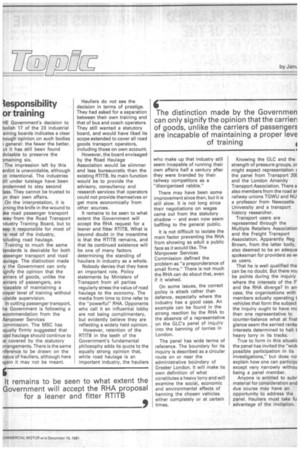lesponsibility or training
Page 31

If you've noticed an error in this article please click here to report it so we can fix it.
HE Government's decision to bolish 17 of the 23 industrial -aining boards indicates a clear nough opinion on such bodies general: the fewer the better. ut it has still been found dvisable to preserve the 3maining six.
The impression left by this erdict is unavoidable, although ot intentional. The industries till under tutelage have been ondemned to stay second lass. They cannot be trusted to _in their own affairs.
On the interpretation, it is irning the knife in the wound to 3ke road passenger transport way from the Road Transport idustry Training Board, but to eep it responsible for most of le rest of the industry, "eluding road haulage. Training to much the same tandards is desirable for both ,assenger transport and road aulage. The distinction made ly the Government can only ignify the opinion that the arriers of goods, unlike the arriers of passengers, are "capable of maintaining a
■ roper level of training without iutside supervision.
In cutting passenger transport, he Government is following a ecommendation from the ilanpower Services :ommission. The MSC has !qually firmly suggested that cad haulage should continue to )e covered by the statutory irrangements. There is the same nference to be drawn on the latus of hauliers, although here !gain it may not be meant. Hauliers do not see the decision in terms of prestige. They had asked for a separation between their own training and that of bus and coach operators. They still wanted a statutory board, and would have liked its scope extended to cover all road goods transport operators, including those on own account.
However, the board envisaged by the Road Haulage Association would be slimmer and less bureaucratic than the existing RTITB. Its main function would be to provide the advisory, consultancy and research services that operators could not provide themselves or get more economically from other sources.
It remains to be seen to what extent the Government will accept the RHA request for a leaner and fitter RTITB. What is beyond doubt in the meantime is that the RTITB remains, and that its continued existence will be one of many factors determining the standing of hauliers in industry as a whole.
Nobody denies that they have an important role. Policy statements by Ministers of Transport from all parties regularly stress the value of road haulage to the economy. The media from time to time refer to the "powerful" RHA. Opponents who call it an influential lobby are not being complimentary, but evidently believe they are reflecting a widely held opinion.
However, retention of the RTITB in the teeth of the Government's fundamental philosophy adds its quota to the equally strong opinion that, while road haulage is an important industry, the hauliers who make up that industry still seem incapable of running their own affairs half a century after they were branded by their railway competitors as a "disorganised rabble."
There may have been some improvement since then, but it is still slow. It is not long since their negotiations on wages came out from the statutory shadow — and even now seem baffling to the general public.
It is not difficult to isolate the main factor preventing the RHA from showing as adult a public face as it would like. The Manpower Services Commission defined the problem as "a preponderance of small firms." There is not much the RHA can do about that, even if it wished.
On some issues, the correct policy is attack rather than defence, especially where the industry has a good case. An example can be found in the strong reaction by the RHA to the absence of a representative on the GLC's panel of inquiry into the banning of lorries in London.
The panel has wide terms of reference. The boundary for its inquiry is described as a circular route on or near the administrative boLindary of Greater London. It will make its own definition of what constitutes a heavy lorry and will examine the social, economic and environmental effects of banning the chosen vehicles either completely or at certain times. Knowing the GLC and the strength of pressure groups, or might expect representation c the panel from Transport 20( and the London Amenity Transport Association. There a also members from the road ar railway unions TGWU and NU a professor from Newcastle University and a transport history researcher.
Transport users are represented through the Multiple Retailers Association and the Freight Transport Association. Apparently Reg Brown, from the latter body, also deemed to be an adequa spokesman for providers as WI as users.
That he is well qualified the can be no doubt. But there mu be points during the inquiry where the interests of the F and the RHA diverge? In an, case, the organisations with members actually operating t vehicles that form the subject the inquiry ought to have mc than one representative to counter-balance what at first glance seem the serried ranks interests determined to halt t heavy lorry in its tracks.
True to form in this situatic the panel has invited the "with possible participation in its investigations," but does no explain how one can participi except very narrowly withou being a panel member.
Anyone is entitled to subr material for consideration and due course may have an opportunity to address the panel. Hauliers must take fu advantage of the invitation.






































